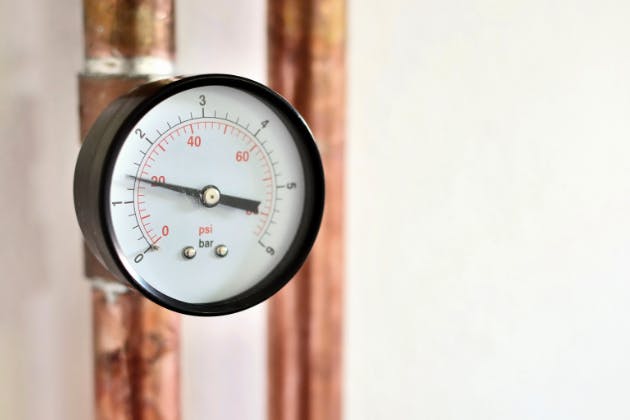When your boiler loses pressure it can cause poor heating and a variety of other issues. Let's look at why your boiler can be losing pressure and what you can do about it.
For expert boiler repairs in Dagenham, Romford and Hornchurch call us on 08000282031 or 01708444685.
What is Boiler Pressure?
Boiler pressure is the balance of water and air within your boiler system, measured in bars. It's essential for the efficient operation of your boiler, ensuring that hot water circulates properly through your heating system.
How Does Boiler Pressure Work?
Your boiler heats water, which then expands and increases the pressure within the system. A well-functioning boiler maintains a stable pressure level, usually between 1 and 2 bars when cold and slightly higher when the system is hot.
Common Signs of Boiler Pressure Loss
- The boiler pressure gauge shows a reading below 1 bar.
- Your heating system is not heating your home effectively.
- You notice water leaks around the boiler or radiators.
- The boiler frequently shuts down or requires resetting.
Potential Risks of Ignoring Pressure Loss
Ignoring low boiler pressure can lead to more severe issues, including complete system breakdown, increased energy bills due to inefficiency, and potential damage to your boiler.
Causes of Boiler Pressure Loss
Leaks in the System
Leaks are one of the most common reasons for pressure loss. They can occur in various parts of the system, including pipes, radiators, and the boiler itself.
Faulty Pressure Relief Valve
The pressure relief valve is designed to release excess pressure from the boiler. If it's faulty or stuck, it might release water even when it's not supposed to, causing a drop in pressure.
Air Trapped in the System
Air trapped in your heating system can cause pressure fluctuations. This often happens after bleeding radiators or if the system hasn't been properly vented.
Expansion Vessel Issues
The expansion vessel absorbs the increased pressure as the water heats up. If it's damaged or malfunctioning, it can cause significant pressure loss.
Radiator Problems
Radiators can develop leaks or air pockets, both of which can lead to a drop in boiler pressure.
Diagnosing Boiler Pressure Loss
Checking for Visible Leaks
Inspect all visible pipes, radiators, and the boiler itself for any signs of water leakage. Pay special attention to joints and connections.
Inspecting the Pressure Relief Valve
Look for any signs of water discharge from the pressure relief valve. If water is constantly dripping, the valve might need replacement.
Assessing the Expansion Vessel
Test the expansion vessel by pressing the Schrader valve. If water comes out instead of air, the vessel's diaphragm might be damaged.
Bleeding the Radiators
Air trapped in radiators can be released by bleeding them. This involves opening a small valve on the radiator and letting the trapped air escape.
Fixing Boiler Pressure Loss
Sealing Leaks
If you find any leaks, they need to be sealed promptly. This might involve tightening connections or replacing damaged sections of pipe.
Replacing or Repairing the Pressure Relief Valve
A faulty pressure relief valve should be repaired or replaced by a professional to ensure it's functioning correctly.
Correcting Issues with the Expansion Vessel
If the expansion vessel is faulty, it may need to be recharged with air or replaced entirely.
Properly Bleeding the Radiators
Ensure all radiators are properly bled to remove any trapped air. This helps maintain a stable pressure in the system.
Get in touch with heating engineers in Dagenham, Romford and Hornchurch
For professional boiler repairs, call us on 08000282031 or 01708444685 and we'll be happy to help.


